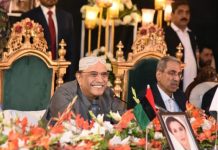By Raziq Ali Shah
ISLAMABAD, Nov 17 (APP): Switching towards Competitive Trading Bilateral Contracts Market (CTBCM) regime, liberalization and privatization of power sector will have longstanding effects on power tariff, paving way for relief to consumers and contribute to overall economic growth of the country.
Since high-power tariff had been hammering our economic growth and piling up huge circular debt, the initiative of premature termination of power purchase agreements (PPAs) with dozens of independent power producers (IPPs) will also help resolve these grave issues.
Mounting debt load, rising power prices and an astonishing Rs 1,411,669 million capacity payment made to IPPs during fiscals 2022-23 and 2023-24 made the Prime Minister Shehbaz Sharif’s government to come out with solutions to stem out this menace and lessen burden on consumers and national kitty.
The government set up a Task Force to implement structural reforms with Minister for Power Sardar Awais Ahmad Khan Leghari as its Chairman, PM’s Special Assistant on power Muhammad Ali as co-Chairman and Lt Gen Zafar Iqbal as National Coordinator also including in it representatives from various regulatory bodies.
Initially, after detailed deliberations with IPPs, Awais Leghari announced premature termination of PPAs with five oldest IPPs to save Rs 411 billion with an impact of around 71 paisa per unit on average electricity tariff. “Contracts with Saba, Lalpir, Atlas and Rousch having accumulative generation capacity of 2,463 Megawatt (MWs), set up under 1994 power policy were terminated through ‘mutual agreement.”
Leghari said, process of reviewing contracts with other IPPs and state-owned power plants would further reduce tariffs by Rs 8-10 per unit. “Termination agreement with five IPPs was one of the several measures to reduce tariffs. We also desire to convert existing clause of ‘take or pay’ for IPPs established under 2002 power policy, to ‘take and pay.”
He also mentioned to reducing tariffs by Rs3.5 per unit through agreements with local IPPs, Rs3.75 per unit by re-profiling debt of Chinese IPPs, Rs0.75 per unit through surcharges, Rs0.72 per unit by closing five IPPs and Rs0.16 per unit reduction by removing television fee from electricity bills.
Special Assistant to PM, Muhammad Ali also hoped an agreement with bagasse based power plants for tariff cuts and revise PPAs with 18 other IPPs within next four to six months. “Negotiations had been completed with bagasse-based IPPs for delinking their international coal-based pricing indexed to US dollar, replacing it with Pak rupee and summary had been sent to federal cabinet for approval.”
He said, renegotiation with IPPs of sugar mills had now been aligned to tariff structures as they were paid around 13-17 percent returns in Pakistan, twice than offered in any other country.
Since negotiations are underway with more than a dozen companies, Director Technical NEPRA Gul Hassan Bhutto was confident that by moving to CTBCM regime, businesses and ordinary consumers would be able to procure electricity directly from suppliers at competitive rates. “Our power sector was in urgent need of reform and CTBCM regime is hoped to address its long-standing issues.”
Executive Director of Sustainable Development Policy Institute (SDPI) Abid Qaiyum Suleri also opined that re-negotiating agreements with IPPs based on principles of transparency and accountability is crucial to reduce increasing burden of capacity payments on masses. “IPPs were introduced as panacea to reduce 15-16 hours load shedding of the past but over the time, they overburdened our economy as well as consumers.”
It is astonishing that 36 IPPs were paid Rs 1,411,669 million capacity payment during fiscal years 2022-23 and 2023-24 as revealed in a recent National Assembly session. Out of this sum, Rs 487,851 million were paid to IPPs in 2022-23 and Rs 923,818 million in 2023-24, as capacity payment.
According to break up, during 2022-23, Rs 94,753 million were paid to China Power Hub Generation Company, Rs 39,609 million to Engro Powergen Thar (Pvt), Ltd, Rs, 55,747 million to Huaneng Shandong Ruyi Energy (Pvt) Ltd, Rs 34,556 million to Karot Power Company (Pvt) Ltd, Rs 28, 604 to Lucky Electric Power Company Ltd, Rs 10,573 million to Mira Power Limited, Rs 34,465 t Neelum Jhelum Hydropower Company (Pvt) Ltd, Rs 63,612 million to Port Qasim Electric Power Company (Pvt) Ltd, Rs 14,477 million to Star Hydro Power Limited, Rs. 22,187 million to Hub Power Company Ltd, Rs 16,985 to Uch-II Power (Pvt) Limited and Rs 11,508 million Thar Coal Block-1 Power Generation Company (Pvt) Limited.
Similarly, during 2023-24, an amount of Rs 139,181 million was paid to China Power Hub Generation Company, Rs 50,414 million to Engro Powergen Thar (Pvt), Ltd, Rs, 132,407 million to Huaneng Shandong Ruyi Energy (Pvt) Ltd, Rs 77,994 million to Karot Power Company (Pvt) Ltd, Rs 53,511 million to Lucky Electric Power Company Ltd, Rs 16,592 million to Mira Power Limited, Rs 35,155 to Neelum Jhelum Hydropower Company (Pvt) Ltd, Rs 102,891 million to Port Qasim Electric Power Company (Pvt) Ltd, Rs 19,296 million to Star Hydro Power Limited, Rs. 21,381 million to Hub Power Company Ltd, Rs 21,900 to Uch-II Power (Pvt) Limited and Rs 105,102 million to Thar Coal Block-1 Power Generation Company (Pvt) Limited, Rs 31,167 million to Thar Energy Limited, Rs 34,733 million to ThalNova Power Thar (Pvt) Ltd and Rs 21,900 million to Uch-II Power (Pvt) Limited.

















